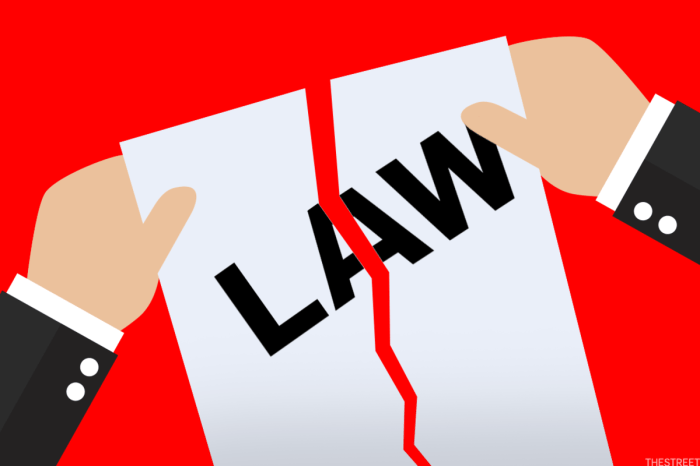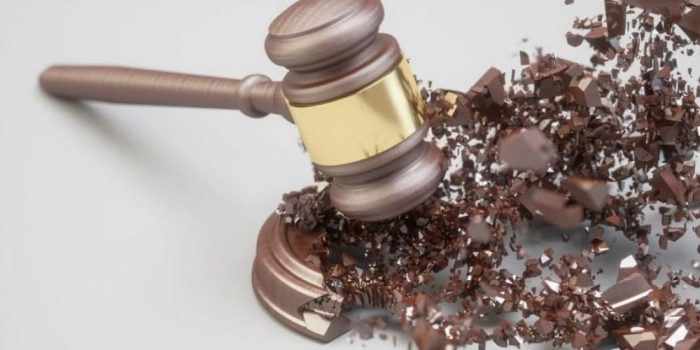The legal profession, built upon principles of integrity and justice, is not immune to the flaws of human nature. This exploration delves into the unsettling reality of when attorneys break the law, examining the diverse forms of misconduct, the underlying causes, and the far-reaching ramifications for both the legal system and those affected. We will uncover the pressures that can lead to ethical lapses, analyze the disciplinary processes involved, and consider strategies for prevention and mitigation.
From unintentional errors to deliberate criminal acts, the spectrum of attorney misconduct is broad. This investigation will dissect various cases, highlighting the consequences for clients, the profession’s reputation, and the public trust. We will also explore the systemic factors that contribute to unethical behavior and examine effective preventative measures.
Types of Legal Misconduct by Attorneys
Attorneys, like all professionals, are subject to ethical rules and legal statutes governing their conduct. Breaches of these rules can result in serious consequences, impacting both the attorney’s career and their clients’ interests. Understanding the various types of legal misconduct is crucial for maintaining the integrity of the legal profession.
Ethical Violations
Ethical violations constitute a significant category of attorney misconduct. These violations stem from breaches of professional codes of conduct, which vary slightly by jurisdiction but generally address issues such as conflicts of interest, confidentiality, competence, and diligence. A common example is representing clients with conflicting interests without obtaining informed consent. Another frequent violation involves failing to maintain client confidentiality, potentially jeopardizing sensitive information. Lack of competence, such as neglecting to adequately research a case or missing deadlines, also falls under this category.
Criminal Acts Committed by Attorneys
Attorneys, like any other citizen, can commit criminal acts. These acts, when committed in the course of their legal practice, represent a particularly egregious form of misconduct. Examples include embezzlement of client funds, perjury (lying under oath), obstruction of justice, and bribery. The severity of the consequences for these actions is significantly higher than for ethical violations, often leading to disbarment and criminal prosecution. For instance, an attorney who uses client funds for personal expenses commits embezzlement, a serious felony.
Unintentional Errors versus Intentional Wrongdoing
It is essential to distinguish between unintentional errors and intentional wrongdoing. Unintentional errors, such as missing a filing deadline due to an oversight, might result in disciplinary action, but the consequences are generally less severe than those for intentional acts. Intentional wrongdoing, on the other hand, such as knowingly submitting false evidence to a court, is a far more serious offense with harsher penalties. The intent behind the action is a key differentiator in determining the severity of the misconduct and the appropriate disciplinary response.
Disciplinary Actions for Attorney Misconduct
The following table Artikels disciplinary actions for various levels of attorney misconduct. The severity of the penalty is dependent on numerous factors, including the nature of the offense, the attorney’s prior disciplinary record, and the impact on the client.
| Offense | Severity | Typical Penalty | Impact on Client |
|---|---|---|---|
| Failing to communicate with client | Low | Reprimand, continuing legal education | Minor inconvenience, potential delay |
| Conflict of interest | Medium | Suspension, restitution | Potential compromise of case, financial loss |
| Embezzlement of client funds | High | Disbarment, criminal prosecution, imprisonment | Significant financial loss, damage to reputation |
| Perjury | High | Disbarment, criminal prosecution, imprisonment | Severe damage to case, potential wrongful conviction |
Causes and Contributing Factors

Attorneys, like all professionals, face pressures that can lead to unethical or illegal behavior. Understanding these pressures is crucial to preventing misconduct and maintaining the integrity of the legal system. Several factors, often intertwined, contribute to attorneys breaking the law.
The pressures and temptations faced by attorneys are multifaceted and often stem from the inherent nature of their work. The high-stakes environment, coupled with intense competition and the need to achieve favorable outcomes for clients, can create a breeding ground for ethical lapses. The desire to win, coupled with the immense pressure to perform, can sometimes overshadow ethical considerations. Furthermore, the legal profession itself, with its hierarchical structure and often demanding workload, can inadvertently contribute to a culture where ethical compromises are perceived as necessary for survival or advancement.
Substance Abuse
Substance abuse significantly impacts an attorney’s judgment and ability to practice law ethically. Addiction to alcohol or drugs can impair cognitive function, leading to poor decision-making, impulsivity, and a disregard for professional responsibilities. This can manifest in various forms of misconduct, including neglecting client cases, missing deadlines, engaging in dishonest conduct, and even committing crimes. The stress and pressure inherent in the legal profession can contribute to substance abuse, creating a vicious cycle where addiction exacerbates existing pressures and further increases the risk of misconduct. Treatment and support programs are crucial in addressing this issue and helping affected attorneys recover.
Ambition and Financial Pressures
The pursuit of success and financial stability often exerts considerable pressure on attorneys. Ambition, while generally a positive trait, can sometimes lead to unethical shortcuts if unchecked. The desire for advancement, coupled with the high financial stakes involved in many legal cases, can tempt attorneys to engage in actions that compromise their ethical obligations. Examples include billing clients for excessive or unnecessary work, engaging in conflicts of interest for financial gain, or even manipulating evidence to secure a favorable outcome. These pressures are amplified in competitive legal markets where success is often measured by financial reward.
Systemic Issues within the Legal Profession
Systemic issues within the legal profession itself can also contribute to unethical behavior. These issues may include inadequate supervision of junior attorneys, a lack of mentorship and ethical training, and an environment that tolerates or even encourages aggressive or unethical practices. Furthermore, an overly competitive and hierarchical structure can create a culture where ethical concerns are subordinated to the pursuit of success. A lack of robust mechanisms for reporting and investigating attorney misconduct can also perpetuate unethical behavior. For example, a law firm’s culture that prioritizes billable hours above ethical considerations can indirectly encourage unethical practices, such as overbilling or rushing through cases without due diligence. Similarly, a lack of adequate oversight by bar associations or regulatory bodies can create an environment where misconduct goes unpunished, thereby encouraging further unethical behavior.
Case Studies and Examples

Understanding the ramifications of attorney misconduct requires examining specific instances. These cases highlight the diverse ways legal professionals can violate ethical standards and the subsequent impact on the legal system and public trust. Analyzing these examples provides crucial insights into preventing future occurrences and strengthening accountability mechanisms.
The Case of Mike Nifong and the Duke Lacrosse Case
The Duke lacrosse case, involving allegations of rape against three members of the Duke University lacrosse team, serves as a stark example of prosecutorial misconduct. Mike Nifong, the Durham County district attorney, pursued the case aggressively despite a lack of credible evidence. His actions included making inflammatory public statements prejudicing the potential jury pool, withholding exculpatory evidence from the defense, and relying on unreliable and coerced testimony. The case ultimately collapsed, with all charges against the three players dropped. Nifong’s actions were deemed so egregious that he was disbarred and faced criminal charges, ultimately pleading guilty to a misdemeanor charge of contempt of court. The case highlighted the devastating consequences of prosecutorial overreach and the importance of ethical conduct in the pursuit of justice. The narrative unfolded with Nifong’s initial press conferences painting a damning picture of the accused, followed by the gradual unraveling of his case as inconsistencies and flawed evidence came to light. The defense successfully challenged the credibility of the accuser’s testimony and exposed Nifong’s suppression of evidence. The resulting damage to the reputations of the accused, the Duke University community, and the integrity of the legal system was immense and long-lasting.
Notable Cases Illustrating Various Forms of Legal Transgression
The following list presents a selection of notable cases illustrating the diverse range of attorney misconduct:
- The Savings and Loan Scandal (1980s-1990s): Numerous attorneys were implicated in facilitating fraudulent activities within the savings and loan industry, resulting in significant financial losses and widespread public distrust.
- The Enron Scandal (early 2000s): Lawyers working for Enron and its associated firms were complicit in creating and concealing fraudulent accounting practices, leading to the company’s collapse and significant investor losses. These actions highlighted the potential for conflicts of interest and the ethical challenges faced by attorneys representing large corporations.
- The Martha Stewart Case (early 2000s): Martha Stewart’s case involved allegations of insider trading and obstruction of justice, raising questions about the ethical responsibilities of attorneys advising high-profile clients.
- Various cases involving mishandling of client funds: Numerous instances of attorneys misappropriating client funds for personal use demonstrate a clear breach of fiduciary duty and highlight the importance of robust financial oversight within law firms.
Long-Term Effects of Publicized Attorney Misconduct on Public Trust
Publicized cases of attorney misconduct significantly erode public trust in the legal profession. The consequences extend beyond the immediate impact on the individuals involved. A loss of faith in the integrity of the legal system can lead to decreased public participation in legal processes, reduced willingness to cooperate with law enforcement, and a decline in the overall effectiveness of the justice system. Moreover, the reputational damage to the legal profession can be long-lasting, requiring significant efforts to rebuild public confidence and reinforce ethical standards. The Duke Lacrosse case, for instance, fueled public skepticism towards the prosecution and raised concerns about the potential for bias and misconduct within the legal system. The lasting impact on the perception of the legal profession is a factor that requires ongoing attention and reform efforts.
Wrap-Up

Ultimately, understanding when attorneys break the law is crucial for maintaining the integrity of the legal system. By analyzing the causes, consequences, and preventative measures, we can work towards a profession that consistently upholds the highest ethical standards. While the pursuit of justice is paramount, the human element inevitably introduces complexities. This exploration serves as a reminder of the importance of accountability and the ongoing need for vigilance within the legal community.
Frequently Asked Questions
What is the difference between legal malpractice and attorney misconduct?
Legal malpractice is negligence or incompetence in the performance of legal services, leading to harm to the client. Attorney misconduct is a broader term encompassing ethical violations and criminal acts, which may or may not involve client harm.
Can an attorney be disbarred for a single instance of misconduct?
It depends on the severity of the misconduct. A single serious offense, such as felony conviction or fraud, could lead to disbarment. Less serious offenses may result in suspension or probation.
What resources are available to attorneys struggling with substance abuse?
Many bar associations offer confidential assistance programs, including referrals to treatment centers and support groups. The Lawyers’ Assistance Programs (LAPs) are a common resource.
Are there specific laws addressing attorney misconduct at the federal level?
While state bar associations primarily handle attorney discipline, federal laws, such as those related to fraud and obstruction of justice, can also apply to attorney misconduct.